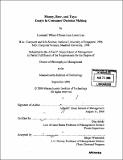Money, beer, and toys : essays on consumer decision making
Author(s)
Lee, Leonard Whee-Chuen Lee-Loon Lee
DownloadFull printable version (6.366Mb)
Other Contributors
Sloan School of Management.
Advisor
Dan Ariely.
Terms of use
Metadata
Show full item recordAbstract
Essay 1: Shopping Goals, Goal Concreteness, and Conditional Promotions. We propose a two-stage model to describe the increasing concreteness of consumers' goals during the shopping process, testing the model through a series of field experiments at a convenience store. Using a number of different process measures (experiment 1), we first established that consumers are less certain of their shopping goals and construe products in less concrete terms when they are in the first (vs. second) stage of the shopping process. The results of experiments 2 and 3 next demonstrate that goal-evoking marketing promotions (e.g. conditional coupons) are more effective in influencing consumers' spending when consumers' goals are less concrete. Essay 2: Try It, You'll Like It: The Influence of Expectation, Consumption, and Revelation on Preferences for Beer. Patrons of a pub evaluated regular beer and "MIT brew" (the same regular beer with some balsamic vinegar) in one of three conditions. One group tasted them blind (the secret ingredient was never disclosed). A second group was informed of the contents before tasting. A third group learned of the secret ingredient immediately after tasting, but prior to indicating their preference. (cont.) Not surprisingly, preference for the MIT brew was higher in the blind condition than either of the two disclosure conditions. However, the timing of the information mattered substantially. Disclosure of the secret ingredient significantly reduced preference only in the before condition, when it preceded tasting, suggesting that disclosure affected preferences by influencing the experience itself, rather than by acting as an independent negative input or by modifying one's retrospective interpretation of the experience. Essay 3: In Search of Homo Economicus: Preference Consistency, Emotions, and Cognition. Understanding the roles of emotion and cognition in forming preferences is critical in helping firms choose effective marketing strategies and consumers make appropriate consumption decisions. In this work, we investigate the role of the emotional and cognitive systems in preference consistency (transitivity). Participants were asked to make a set of binary choices under conditions that were aimed to tap emotional versus cognitive decision processes. (cont.) The results of three experiments consistently indicate that automatic affective responses are associated with higher levels of preference transitivity than deliberate cognitive considerations, and suggest that the basis of this central aspect of rational behavior-transitivity-lies in the limbic system rather than the cortical system.
Description
Thesis (Ph. D.)--Massachusetts Institute of Technology, Sloan School of Management, 2006. Includes bibliographical references.
Date issued
2006Department
Sloan School of ManagementPublisher
Massachusetts Institute of Technology
Keywords
Sloan School of Management.